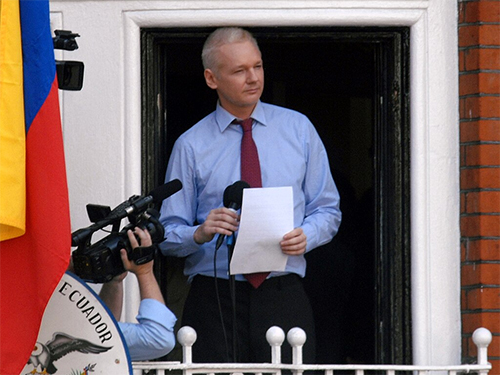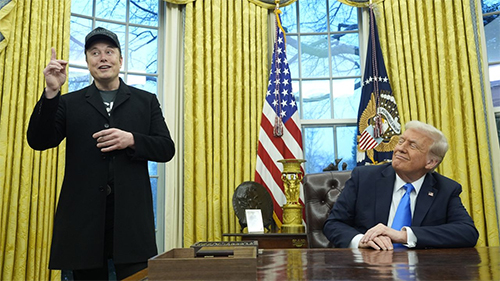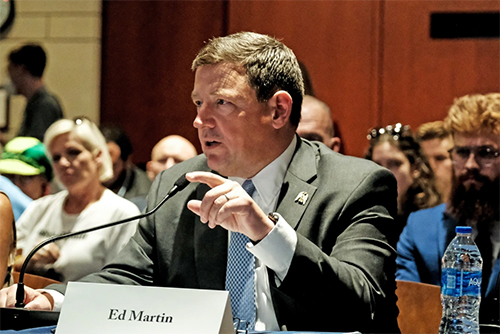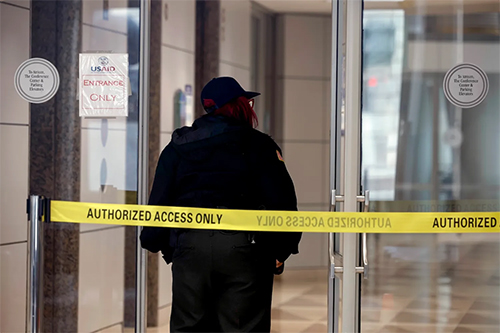by Seymour Hersh
Feb 17, 2025
NOTICE: THIS WORK MAY BE PROTECTED BY COPYRIGHT
YOU ARE REQUIRED TO READ THE COPYRIGHT NOTICE AT THIS LINK BEFORE YOU READ THE FOLLOWING WORK, THAT IS AVAILABLE SOLELY FOR PRIVATE STUDY, SCHOLARSHIP OR RESEARCH PURSUANT TO 17 U.S.C. SECTION 107 AND 108. IN THE EVENT THAT THE LIBRARY DETERMINES THAT UNLAWFUL COPYING OF THIS WORK HAS OCCURRED, THE LIBRARY HAS THE RIGHT TO BLOCK THE I.P. ADDRESS AT WHICH THE UNLAWFUL COPYING APPEARED TO HAVE OCCURRED. THANK YOU FOR RESPECTING THE RIGHTS OF COPYRIGHT OWNERS.

Elon Musk, joined by his son X Musk, stands next to President Donald Trump as he speaks during an executive order signing in the Oval Office on February 11. / Photo by Andrew Harnik/Getty Images.
Consider three premises about the current American leadership crisis.
One: there are many reasonable ways to trim the federal budget, and the most logical way to cut the budget is to start where it is most bloated—the Pentagon. Why not begin with the F-35 Lightning II Joint Strike Fighter, which went into use in 2015 after two decades of cost overruns that totaled more than two trillion dollars. Shutting up Washington’s Consumer Financial Protection Bureau will give solace to the nation’s banking and finance world, but not much else. (Its annual budget is $823 million.)
Two: President Donald Trump believes or wants to believe—not sure there is a difference—that Article 2 of the Constitution, which says that executive power is vested in the presidency, gives him what he has called “the right to do whatever I want.” Hence his constant talk now of running for yet another term in office.
Three: I have been told by those who know the US hacking community that the young members of Elon Musk’s Department of Government Efficiency computing team now running amok inside the Treasury Department, where America’s checks are drawn up, would not have been granted a clearance had they sought computer jobs with the federal government. But there is little doubt about the skills of Musk’s young Turks and their ability to get proprietary information that would enrich their boss. Musk does billions of dollars in business with the federal government, and analyzing and evaluating the way various bureaucrats evaluate his firms’ contract proposals—and those of their competitors—would be of prime interest.
The other key players along with Musk are Russell Vought, recently confirmed as a director of the White House’s Office and Management and Budget, which is as important as it sounds, especially to the Musk operatives, and Stephen Miller, the White House deputy chief of staff. Both are political extremists. Vought was one of the principal drafters of Project 2025, a radical proposal for the current reshaping of the government that emerged from the conservative Heritage Foundation. The proposals terrified Democrats—though not enough—during last year’s presidential race. The more outspoken and pugnacious Miller, once a close ally of Steve Bannon, worked on immigrant issues during Trump’s first term in office from 2017 to 2021. He was known for his harsh views on immigration that included the separation of migrant children from their parents when they crossed the US border. Such action, Miller said, would deter parents from attempting to cross the border illegally. Miller, too, was on the advisory board for Project 2025.
There is a history of this kind of right-wing madness. Two decades ago, I wrote a series of articles about the Office of Special Plans in the Pentagon, a secret intelligence unit that reported directly to Donald Rumsfeld, the secretary of defense. It was staffed by a group of political zealots who were followers of Leo Strauss, a philosopher at the University of Chicago who believed that the work of ancient philosophers contained deliberately concealed esoteric meanings whose truth could be comprehended by only a very few and would be misunderstood by the masses.
Strauss’s intellectual followers included Paul Wolfowitz, the deputy secretary of defense, and many members of the Office of Special Plans. They chose not to rely on intelligence that had been analyzed and vetted by professionals in the Central Intelligence Agency and National Security Agency, and instead were sending their deranged and fabricated intelligence about the nuclear threat from Iraq to Rumsfeld and Vice President Dick Cheney. The result was an unnecessary American war in Iraq in search of a nuclear arsenal that did not exist.
Some survivors of those years remain closely linked to the philosophies of Vought and Miller and they have insight and knowledge to the current goals of those who are now collaborating with Musk to turn America into an intolerant right-wing state controlled by billionaires like Musk and a president who dreams of being king.
Here is an interpretation of what is going on, supported in my other discussions with computer experts, from someone who has a great deal of insight about the people and political philosophies involved:
“Trump was led to believe that most of those working with Musk’s team have been granted ‘Read Only’ access” to Treasury and other vital government computer systems, “but in many cases the youngsters have been able to embed code in the system they were monitoring. The kids are not downloading every single database of the US government but rather focusing on areas within the government that either relate to Musk’s various businesses, or the implementation of Trump’s broader ideological goals—for example, the Treasury payment system.
“Musk has tens of billions of dollars in contracts with the US government. All six of his companies, which include X (formerly Twitter); xAI, a rival to OpenAI; Neuralink, a brain implant startup; SpaceX, which includes Starlink, a satellite internet service; and the Boring company, a tunnel drilling firm); and Tesla, have netted a combined $20 billion in US contracts and subsidies, according to the Financial Times.
“Musk, either with or without the president’s approval, has the authority to review procedures and findings of the key personnel in those federal agencies that have the responsibility to reject or approve his contract bids, and then monitor the implementation of his federal contracts.
“Musk already has forced out several top managers in agencies responsible for monitoring his contracts and replaced them with people who have been with Musk, working in his different companies, for more than a decade.
“He is also getting into all the payout systems in the US government—that pay out $6.75 trillion annually.”
One expert I spoke to was especially critical of Treasury Secretary Scott Bessent, who has stated that he has only given Musk’s people “Read Only” access to the payout systems, which would bar downloading of files and the like.
Bessent either was not informed or not telling the truth, according to the person who initially told me about the easy access the Musk teams have had to the most complex and protected Treasury Department financial transactions. He told me that Musk’s people “have the capacity to see, download, and manipulate all of the government payments, including Medicare and Medicaid payments.” Theoretically, he said, members of Musk’s team, without any security or background checks, would be able to “overwrite authorized funds from the Treasury. Simply choke them off.”
The expert provided an example: Suppose Congress passes a bill authorizing a $100,000 payment to a unit of Planned Parenthood in Chicago. The Treasury Department, acting on Congressional instruction, is getting ready to write a $100,000 check and send it. If Vought or Miller is unhappy about the allocation, they can instruct Musk’s team to block the payment that was authorized by the Treasury. In that action, the expert explained, Vought and Miller had the capacity to override the Constitution, which delegates control of the federal budget to the Congress.
At this point, the expert said, Trump, Vought and Miller have “total control. Congress has approved all of their generally unqualified Cabinet posts and, now that they’ve had their way with Congress, they believe the judiciary cannot stop them.
“Vought and Miller are true Straussians in the sense that they believe, as did Strauss, that America must have an elite who would rule the country. All others are merely subjects. I don’t see the two of them looking to enrich themselves.
“Why aren’t the Democrats raising hell about it? Because they are in total shock.”
I shared the specifics that I had been told in a subsequent conversation with a prominent East Coast professor of computer science who did not wish to be named. He expressed alarm at the extent of Musk’s increasing penetration of America’s government payment system. Musk, he told me, was already benefiting from the chaos but not Miller or Vought. “Those two,” the professor said, “are not looking to benefit themselves. They are administrators—‘banality of evil’ ideologues and fundamentalist types—the hatchet people who carry out the plans of their lords and masters. Musk, on the other hand, is already benefiting from the chaos.
“I would argue there is a fourth level of control: culture. Starting with Trump and Musk, they have zero empathy, zero shame, and a longtime sense of entitlement that laws, norms, and standards do not apply to them. In turn they appoint folks with similar thinking—Vought, Miller, nearly all in the Cabinet—who will enable the more informed worker bees to run wild since nobody—not their boss, not the White House the Congress—unless it’s blatantly obvious or politically embarrassing. And then ‘something has to be done.’
“The only security culture in this regime,” he concluded, “is to protect itself from outside scrutiny.”






